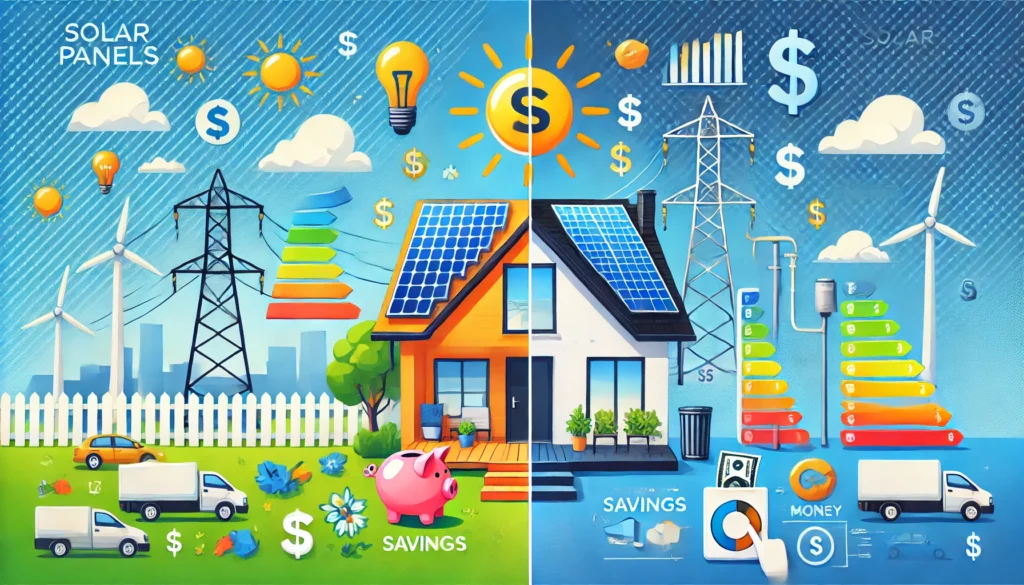Solar Panels vs. Traditional Energy: Which Saves You More in the Long Run?
With rising electricity costs and growing concerns about environmental sustainability, many homeowners are considering switching to solar energy. But how do solar panels stack up against traditional energy sources when it comes to saving money in the long run? In this article, we’ll break down the costs, benefits, and long-term savings of solar panels compared to relying solely on traditional energy sources.
- Understanding Traditional Energy Costs
Traditional energy sources, such as electricity from the grid, are primarily generated using fossil fuels like coal, natural gas, and oil. While these sources are reliable, their costs are steadily increasing due to various factors:
- Rising Utility Rates: Electricity rates have been rising consistently across the U.S., driven by inflation, increased demand, and the costs of maintaining aging infrastructure. This trend shows no signs of slowing, making traditional energy increasingly expensive for homeowners.
- Volatility in Energy Prices: Fossil fuel prices are subject to market fluctuations, which can lead to unpredictable energy bills for consumers.
- Environmental Costs: While not directly reflected on your electricity bill, the environmental impact of traditional energy sources contributes to long-term societal costs, such as climate change and pollution.
Over time, the unpredictable and rising costs of traditional energy can strain household budgets.
- The Initial Investment in Solar Panels
Switching to solar panels requires an upfront investment, but this cost can be offset through various incentives and long-term savings.
- Installation Costs: The average cost of a residential solar panel system ranges from $15,000 to $25,000, depending on system size and location. However, the availability of federal, state, and local incentives can significantly reduce this cost.
- Federal Investment Tax Credit (ITC): Homeowners can claim 30% of their solar installation costs as a tax credit, reducing the overall expense.
- State and Local Incentives: Additional rebates and incentives are available in many regions, further lowering the financial burden.
- Financing Options: Many solar companies offer financing plans, such as solar loans or leases, allowing homeowners to spread out the cost over time while still benefiting from reduced energy bills.
While the upfront cost of solar panels may seem high, the long-term savings often outweigh the initial investment.
- Long-Term Savings with Solar Panels
One of the most significant advantages of solar energy is its ability to reduce or eliminate electricity bills over time.
- Free Energy from the Sun: Once installed, solar panels generate electricity using sunlight, a free and renewable resource. This allows homeowners to significantly cut down on their energy bills.
- Net Metering Benefits: Many states offer net metering programs, which allow homeowners to earn credits for excess energy produced by their solar system. These credits can offset electricity costs during times when the system isn’t generating power (e.g., at night or on cloudy days).
- Lifetime Savings: On average, homeowners save between $10,000 and $30,000 over 20 years by switching to solar, depending on their location and energy usage.
The consistent savings from solar panels make them a cost-effective choice for homeowners looking to reduce their long-term energy expenses.
- The Environmental Savings of Solar Panels
While financial savings are a major motivator, solar panels also provide environmental benefits that traditional energy sources cannot match.
- Reducing Carbon Footprint: Solar energy is clean and renewable, producing no greenhouse gas emissions during operation. This helps combat climate change and reduce air pollution.
- Sustainable Energy Source: Unlike fossil fuels, which are finite and depleting, sunlight is abundant and inexhaustible, making solar energy a sustainable choice for the future.
- Energy Independence: Generating your own electricity with solar panels reduces dependence on fossil fuels and the utility grid, enhancing energy security for your home.
By choosing solar, homeowners contribute to a cleaner, more sustainable planet while enjoying long-term savings.
- Maintenance and Longevity: Solar Panels vs. Traditional Energy
Both solar panels and traditional energy systems require maintenance, but solar systems often have lower upkeep costs over their lifespan.
- Solar Panel Maintenance: Solar panels are highly durable, with minimal maintenance requirements. Occasional cleaning and inspections are usually enough to keep them operating efficiently. Most systems come with warranties of 20–25 years, ensuring reliable performance for decades.
- Utility Grid Maintenance Costs: While homeowners don’t directly pay for maintaining the utility grid, these costs are often reflected in rising utility rates. Power outages and grid repairs can also lead to additional expenses and inconvenience for consumers.
The low-maintenance nature of solar panels makes them an appealing option for homeowners looking for long-term reliability and cost savings.
- Return on Investment (ROI): Solar Panels vs. Traditional Energy
When considering the financial benefits of solar panels, it’s essential to evaluate the return on investment (ROI).
- Solar Panel ROI: On average, solar panels pay for themselves within 6 to 10 years through energy savings. After this period, homeowners enjoy free electricity for the remainder of the system’s lifespan, typically 25 years or more.
- Traditional Energy ROI: With traditional energy, there’s no return on investment. Homeowners continue to pay monthly bills with no opportunity to recoup their expenses.
Solar panels offer a clear financial advantage, providing both short-term savings and long-term ROI.
- Which Option Saves You More in the Long Run?
When comparing solar panels to traditional energy sources, the answer is clear: solar panels save homeowners more money in the long run. Here’s why:
- Lower Monthly Bills: Solar energy significantly reduces or eliminates electricity bills, while traditional energy costs continue to rise.
- Incentives and Rebates: Solar incentives reduce upfront costs and improve affordability, while traditional energy offers no comparable financial benefits.
- Predictable Costs: With solar panels, homeowners enjoy predictable energy costs, while traditional energy bills fluctuate with market conditions.
- Environmental Impact: Solar panels provide environmental savings by reducing carbon emissions and reliance on finite resources.
For homeowners looking to save money, reduce their environmental impact, and gain energy independence, solar panels are the superior choice.
Conclusion
Switching to solar energy is an investment in your financial future and the health of the planet. While traditional energy sources come with rising costs and environmental drawbacks, solar panels offer consistent savings, a high ROI, and the opportunity to harness clean, renewable energy. By choosing solar, you can lower your energy costs, reduce your carbon footprint, and enjoy greater energy independence. Ready to make the switch? Contact us today to learn how solar panels can help you save more in the long run!
Shyne specializes in installing and financing solar panels, making the transition to solar energy seamless for homeowners. Our team of experts ensures that each installation is optimized for maximum efficiency and savings.
Shyne is your trusted partner for solar panel installation and financing in Oklahoma. Get a free quote today! Contact Us
Ready to make the switch?
Contact us today to learn how solar panels can help you save more in the long run!
Complete Residential Solar Panels and Systems. Serving Texas, Oklahoma, Kansas, Missouri, Utah, Florida & Ohio
Get a Free Quote Now
